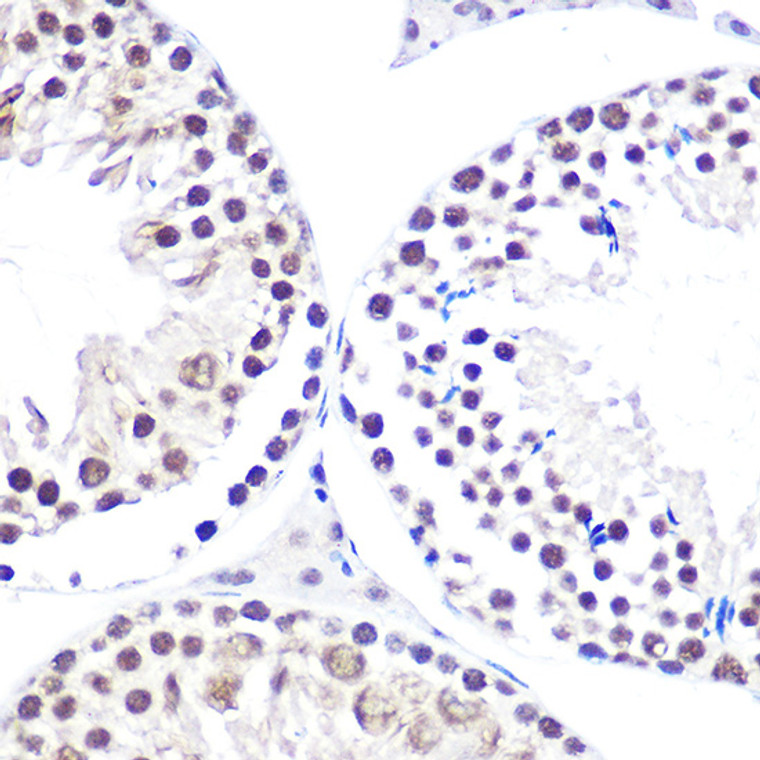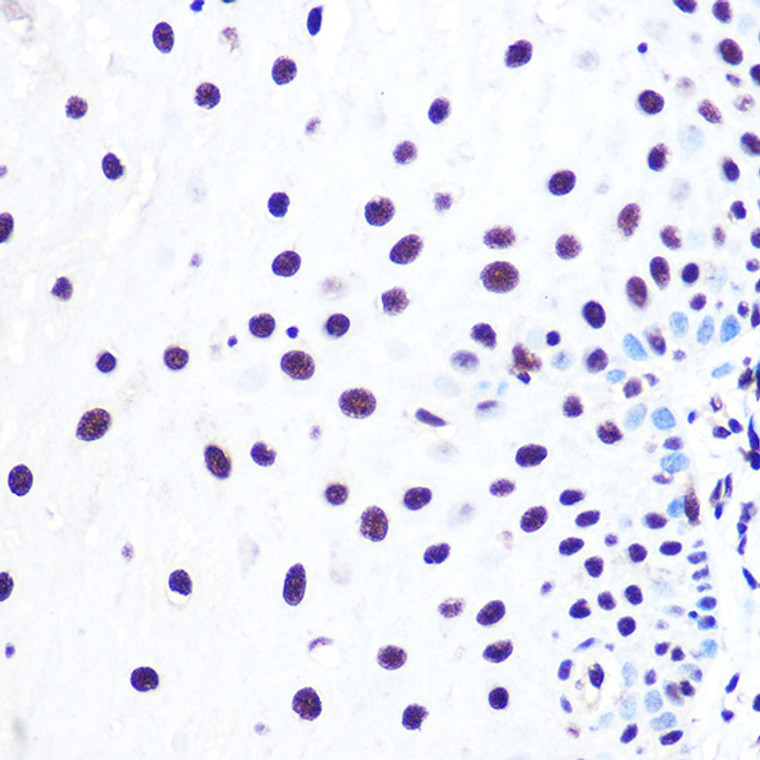| Host: |
Rabbit |
| Applications: |
WB/IHC |
| Reactivity: |
Human/Mouse/Rat |
| Note: |
STRICTLY FOR FURTHER SCIENTIFIC RESEARCH USE ONLY (RUO). MUST NOT TO BE USED IN DIAGNOSTIC OR THERAPEUTIC APPLICATIONS. |
| Short Description: |
Rabbit polyclonal antibody anti-NELFE (1-280) is suitable for use in Western Blot and Immunohistochemistry research applications. |
| Clonality: |
Polyclonal |
| Conjugation: |
Unconjugated |
| Isotype: |
IgG |
| Formulation: |
PBS with 0.02% Sodium Azide, 50% Glycerol, pH7.3. |
| Purification: |
Affinity purification |
| Dilution Range: |
WB 1:500-1:2000IHC-P 1:50-1:200 |
| Storage Instruction: |
Store at-20°C for up to 1 year from the date of receipt, and avoid repeat freeze-thaw cycles. |
| Gene Symbol: |
NELFE |
| Gene ID: |
7936 |
| Uniprot ID: |
NELFE_HUMAN |
| Immunogen Region: |
1-280 |
| Immunogen: |
Recombinant fusion protein containing a sequence corresponding to amino acids 1-280 of human NELFE (NP_002895.3). |
| Immunogen Sequence: |
MLVIPPGLSEEEEALQKKFN KLKKKKKALLALKKQSSSST TSQGGVKRSLSEQPVMDTAT ATEQAKQLVKSGAISAIKAE TKNSGFKRSRTLEGKLKDPE KGPVPTFQPFQRSISADDDL QESSRRPQRKSLYESFVSSS DRLRELGPDGEEAEGPGAGD GPPRSFDWGYEERSGAHSSA SPPRSRSRDRSHERNRDRDR DRERDRDRDRDRDRERDRDR DRDRDRDRERDRDRERDRD |
| Tissue Specificity | Widely expressed. Expressed in heart, brain, lung, placenta, liver, skeletal muscle, kidney and pancreas. |
| Post Translational Modifications | Phosphorylated by the P-TEFb complex at sites next to its RNA recognition motif, promoting its release from chromatin. Sumoylated. Poly-ADP-ribosylated by PARP1, thereby preventing RNA-binding and relieving transcription pausing. |
| Function | Essential component of the NELF complex, a complex that negatively regulates the elongation of transcription by RNA polymerase II. The NELF complex, which acts via an association with the DSIF complex and causes transcriptional pausing, is counteracted by the P-TEFb kinase complex. Provides the strongest RNA binding activity of the NELF complex and may initially recruit the NELF complex to RNA. (Microbial infection) The NELF complex is involved in HIV-1 latency possibly involving recruitment of PCF11 to paused RNA polymerase II. |
| Protein Name | Negative Elongation Factor ENelf-ERna-Binding Protein Rd |
| Database Links | Reactome: R-HSA-112382Reactome: R-HSA-113418Reactome: R-HSA-167152Reactome: R-HSA-167158Reactome: R-HSA-167200Reactome: R-HSA-167238Reactome: R-HSA-167242Reactome: R-HSA-167243Reactome: R-HSA-167246Reactome: R-HSA-167287Reactome: R-HSA-167290Reactome: R-HSA-674695Reactome: R-HSA-6796648Reactome: R-HSA-75955 |
| Cellular Localisation | NucleusChromosomeLocalizes To ChromatinPhosphorylation By The P-Tefb Complex Promotes Its Release From Chromatin |
| Alternative Antibody Names | Anti-Negative Elongation Factor E antibodyAnti-Nelf-E antibodyAnti-Rna-Binding Protein Rd antibodyAnti-NELFE antibodyAnti-RD antibodyAnti-RDBP antibody |
Information sourced from Uniprot.org
12 months for antibodies. 6 months for ELISA Kits. Please see website T&Cs for further guidance










